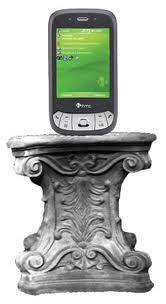Image via intomobile.com
This past month the results came in for the 2011 Museum & Mobile survey. The survey is part of an ongoing research project focused on the uses and trends of mobile technology in museums.
The survey launched last September and had more than 700 responses, with professions ranging from museum employees to mobile technology vendors and researchers. The effort was international, but the majority of responses (80%) were from the United States, with the United Kingdom (5%) and Canada (4%) as the next largest group of respondents.
The survey points to some interesting trends that are cropping up with mobile development for museums. There is a ton of information in the survey, but here are some of the interesting things I pulled from the presentation:
- Of the 738 survey respondents, 30% already have some form of a mobile program in place and 23% planned to develop one. 36% of institutions had no plans to go mobile and the remaining 11% were responses from vendors and researchers.
- When asked which terms best described their current or planned mobile program, the most common responses were: Some sort of audio tour, free for visitors, and visitors were expected to provide their own hardware (i.e. smartphone, iPod).
- The goals for the mobile programs were most commonly described as providing supplementary information and diversifying the visitors’ experience. Personally, I loved that the next two most common goals were an emphasis on experimentation and creating an interactive experience.
- What was most challenging for museums with mobile programs in place? Encouraging adoption among visitors, producing the content, and keeping that content up to date.
- The largest challenge for those planning to develop a mobile plan? The implementation costs.
- Looking ahead five years, most institutions said that implementing in-house content development was a definite goal.
- And what is least likely to be implemented in the next five years? Institution-wide WIFI, real time location services and augmented reality.
- What I found promising was that respondents to the survey had a strong desire to see more research done, even among those who had no mobile plans at all. The most requested areas of research were: Guidelines for user experience design, methods for conducting visitor evaluations and analysis of different technology systems.
So beyond these points, what are some of the larger takeaways from the survey? Well, for one, the survey goes to show that mobile technology is more than a fad. Mobile programs are becoming more common and less of an anomaly among museums. The survey also provides a snapshot of some of the concerns about development and adoption of a mobile program.
It was a little disappointing to see that among the technology being definitely implemented in the next five years, new tech like RTLS and augmented reality were the bottom two. Personally, I would not underestimate the possibility of this technology becoming an expectation among visitors, even within the next few years.
Also, the survey pointed out that 50-55% of respondents consider having a mobile-friendly website as something that should be definitely implemented in the next five years. An organization’s website will often be the first portal of entry for a mobile user, and having a website that is optimized for mobile platforms should be a higher priority.
Overall, I think the biggest takeaway of the survey is that the future of mobile technology in museums will not be just some flashy app. Throughout the field, serious thought is being put into how these programs can be developed in a way that are both substantial and engaging for the user. It was awesome to see institutions describe the goals of their current or planned mobile programs as experimental and interactive.
There were a lot of interesting results from thus survey, the above points were only a few that jumped out at me. For the more in-depth results of the survey visit Museum & Mobile’s website to view the full presentation.

